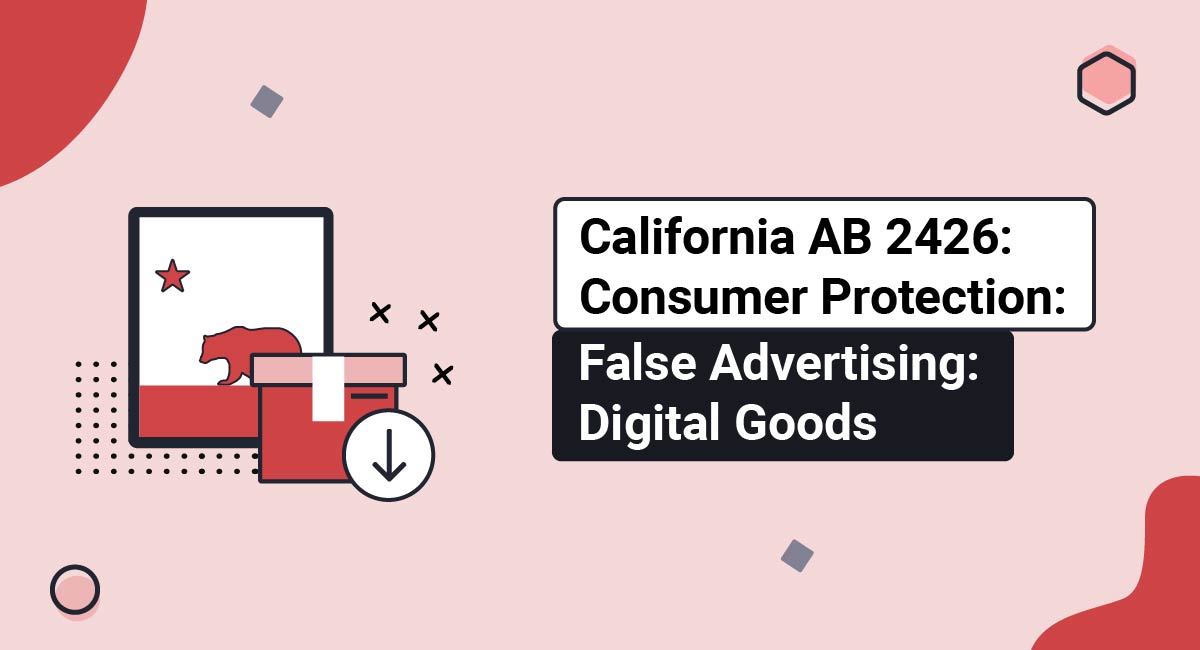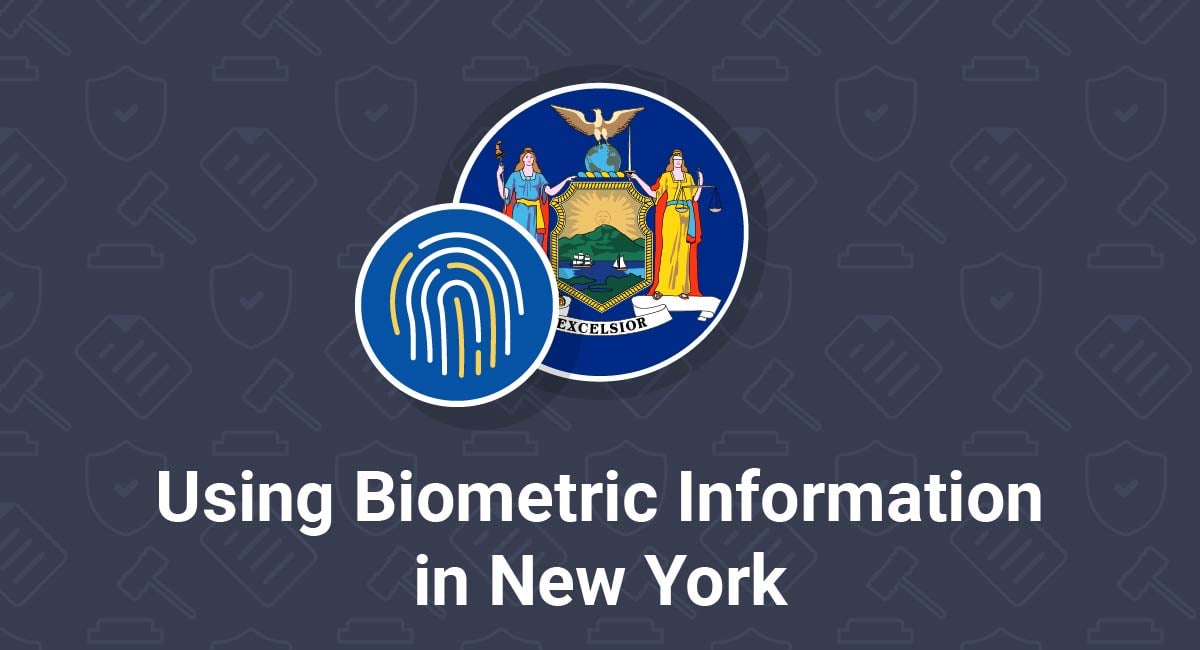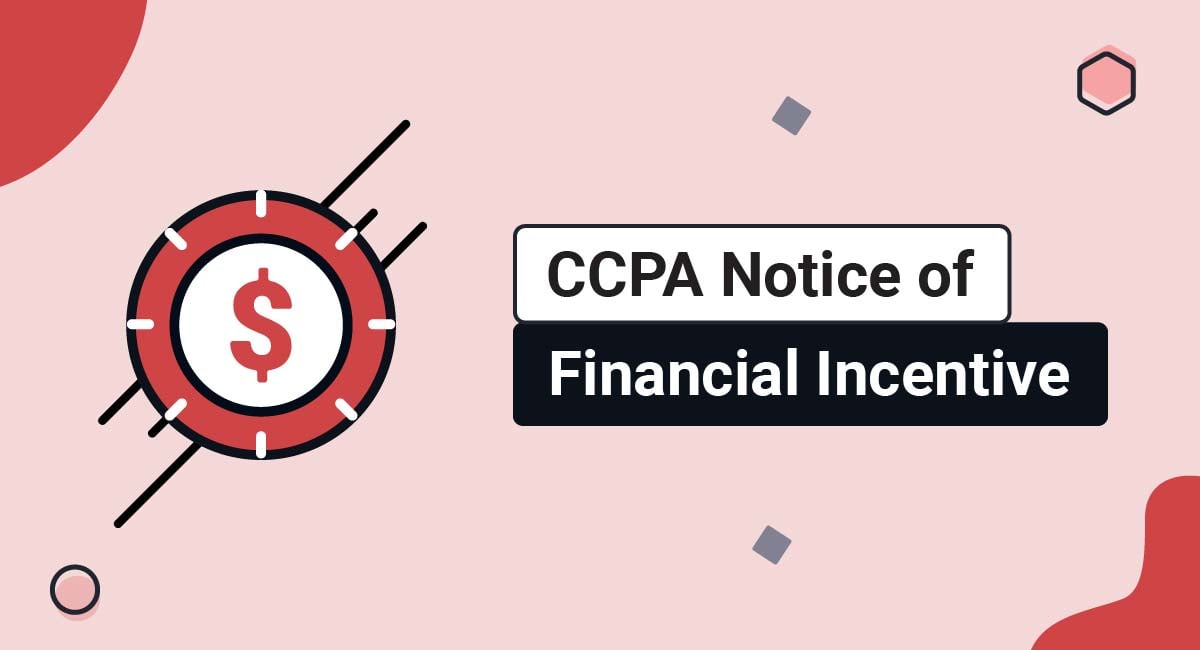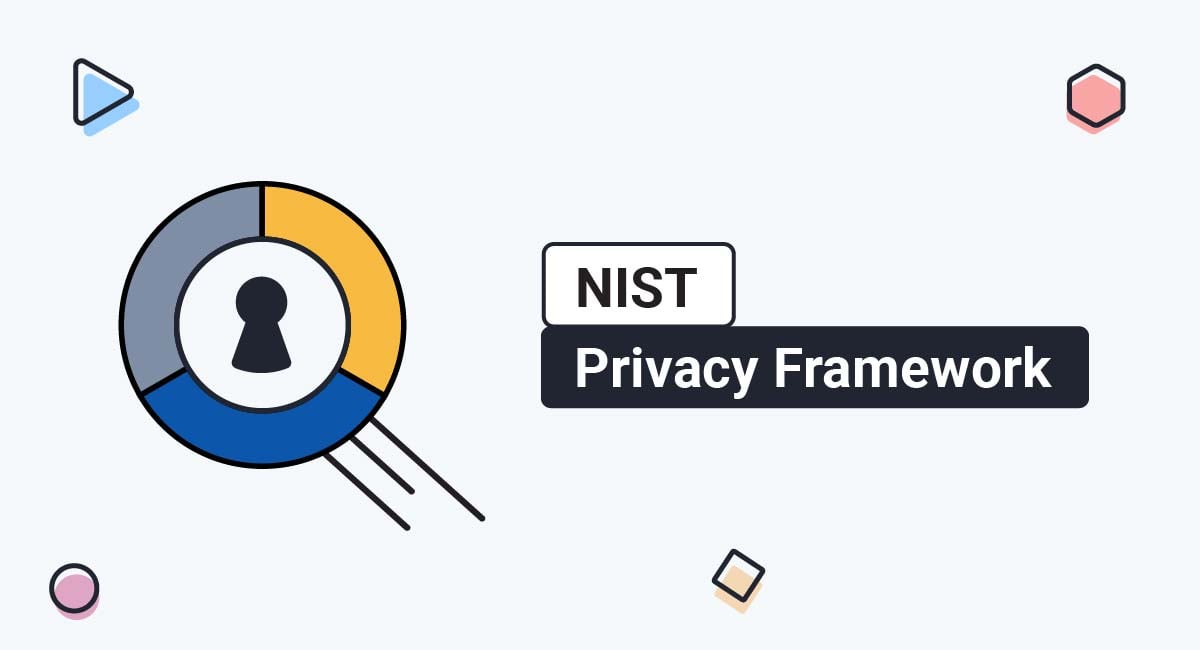California AB 2426 was approved by California Governor Gavin Newsom on September 24, 2024. The law is designed to protect California consumers from false advertising as it applies to digital goods.
This article will explain what this law is, who it applies to, and how to comply with it.
- 1. What is California AB 2426?
- 2. Who Does California AB 2426 Apply to?
- 3. Who is Exempt From California AB 2426?
- 4. What Does California AB 2426 Require?
- 5. How Do You Comply With California AB 2426?
- 5.1. Obtain Affirmative acknowledgment from Consumers
- 5.2. Provide a Clear and Conspicuous Statement to Consumers
- 5.3. Maintain a License Terms and Conditions Agreement
- 6. What are the Penalties for Not Complying with California AB 2426?
- 7. Summary
What is California AB 2426?
California AB 2426 is a consumer protection law that regulates the sale of digital goods. The law was established to ensure that businesses disclose to consumers that they are purchasing a revocable license rather than ownership rights to digital goods.
Consumers who buy certain digital products may not realize that they are actually buying a license to access the goods and are not acquiring full ownership rights to the products.
For instance, a consumer may lose access to digital goods if they violate the seller's Terms and Conditions agreement or if the company providing the digital product ceases operations.
Who Does California AB 2426 Apply to?
California AB 2426 applies to businesses that advertise or sell digital goods to California consumers.
Digital goods can include:
- Digital applications
- Digital audiovisual or audio work
- Digital books
- Digital codes
- Digital games
Digital goods do not include television, video, or radio service distribution or cable television or satellite relay television services.
Section 17500.6 (7) of California AB 2426 includes digital books, codes, and apps in its definition of digital goods:

Who is Exempt From California AB 2426?
California AB 2426 does not apply to:
- Businesses that advertise or sell access to a digital good that is limited to the duration of a subscription period
- Free digital goods
- Digital goods that the seller cannot terminate access to (such as digital goods that can be permanently downloaded, externally stored, and accessed without internet connection)
Section 17500.6 (b)(4) of California AB 2426 explains that the law does not apply to certain subscription services, free digital goods, or non-revocable digital goods:

What Does California AB 2426 Require?
California AB 2426 requires businesses that sell digital goods to follow certain requirements regarding the terms they use in their advertising.
Businesses that sell digital goods cannot advertise a digital good using the terms "buy" or "purchase" (or similar terms) or along with a time-limited rental option unless they either:
- Receive affirmative acknowledgment of licensing information from the purchaser, or
- Provide the consumer with a "clear and conspicuous" statement that contains specific licensing details
The affirmative acknowledgment or clear and conspicuous statement must be distinct and independent from any other terms or conditions regarding the transaction.
Section 17500.6 (1)(b) of California AB 2426 explains that businesses that sell digital goods to California consumers and use the terms "buy," "purchase," or any other terms suggesting full ownership rights or advertise a digital good along with an option for a time-restricted rental must follow its rules:
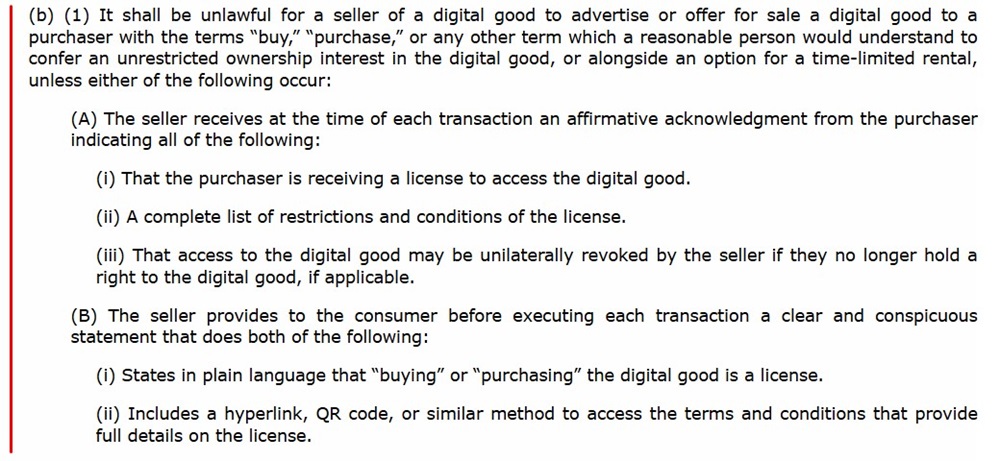
How Do You Comply With California AB 2426?
There are a few steps you can take to comply with California AB 2426, including:
- Obtaining affirmative acknowledgment from consumers
- Providing a clear and conspicuous statement to consumers
- Maintaining a Terms and Conditions agreement specifically for digital goods access
Obtain Affirmative acknowledgment from Consumers
If you choose to obtain affirmative acknowledgment of your digital goods licensing policies from consumers, you must ensure that it includes the following information:
- Confirmation that the purchaser is receiving an access license to the digital product
- A thorough list of the terms and restrictions that apply to the license
- Recognition that the seller can terminate the consumer's access to the digital good (if applicable)
One way to get affirmative acknowledgment is to use a checkbox next to a statement that contains a link to your digital goods terms and states that customers agree to your terms. Customers must tick the checkbox before making a purchase.
For example, consumers must create an account with Ubisoft and tick a checkbox stating that they agree to its linked Terms of Use, Terms of Sale, and Privacy Policy before making a purchase:
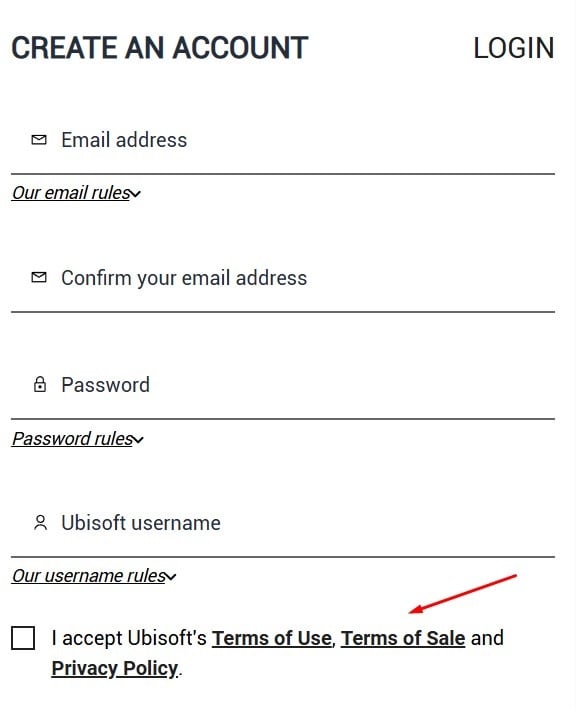
Ubisoft's Terms of Sale explains that by completing an order, customers acquire a revocable, limited license for personal use of its goods:
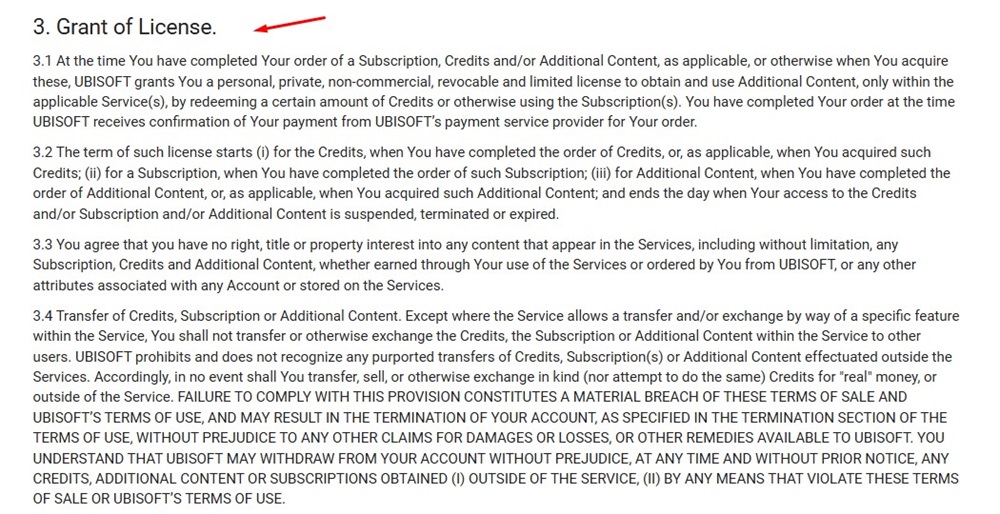
Ubisoft's Terms of Sale goes on to explain that it retains the right to change the availability of or terminate access to its digital goods at its sole discretion:

Provide a Clear and Conspicuous Statement to Consumers
If you choose to provide consumers with a statement, it should be clear and conspicuous and must contain the following information:
- That any mention of "buying" or "purchasing" is in reference to a license (as opposed to the digital good itself)
- A hyperlink, QR code, or comparable method for consumers to access your Terms and Conditions agreement for digital goods
You must provide the statement to consumers before each transaction. To ensure that the statement is "clear and conspicuous," it must be written so that it draws attention to the language. You can use larger fonts, contrasting types, fonts, or colors, or symbols to call attention to the text.
When users go to make a purchase on Steam's website, they are presented with a statement that purchasing a digital product from the company grants them a license for the product. The statement includes a link to Steam's Subscriber Agreement:
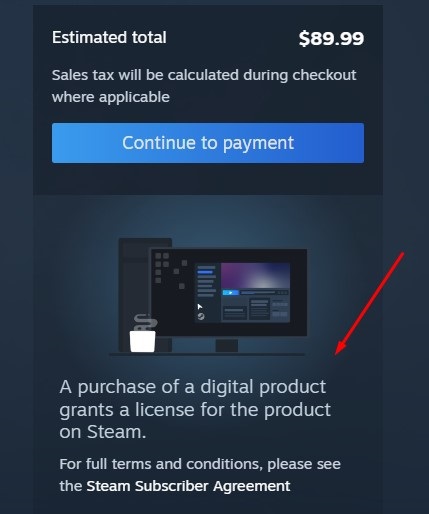
Steam's Subscriber Agreement explains that its content and services are licensed, not sold, and that acquiring a license does not grant the user ownership of the content or services:

Maintain a License Terms and Conditions Agreement
A Terms and Conditions agreement is a document that contains the rules and responsibilities that users must agree to in order to use your products or services. California AB 2426 requires the statement businesses provide to or acknowledgment businesses receive from purchasers to be separate from any other terms or conditions the purchaser agrees to.
Additionally, sellers that provide consumers a statement must include a link to a Terms and Conditions agreement that contains comprehensive information regarding the digital goods license.
Section 17500.6 (b)(2) of California AB 2426 explains that whether businesses choose to receive acknowledgment from purchasers or provide a statement, the information the purchaser agrees to must be separate from any other terms or conditions regarding the transaction:

Creating a License Terms and Conditions agreement is an effective way to comply with California AB 2426 requirements.
Your License Terms and Conditions agreement should include the following clauses:
- Information about how the consumer is purchasing access to a digital goods license rather than the digital product itself
- A list of any terms or restrictions that apply to the digital goods license
- An explanation that you can revoke access to the digital good (if applicable)
Wordfence's License Terms and Conditions agreement explains that it is granting limited license rights to consumers, and that the use of words such as "purchase" or "sale" do not convey ownership rights to its customers:

Right Now's License Terms and Conditions agreement describes its license restrictions, including selling, transferring, or distributing copies of its software or documentation to third parties:
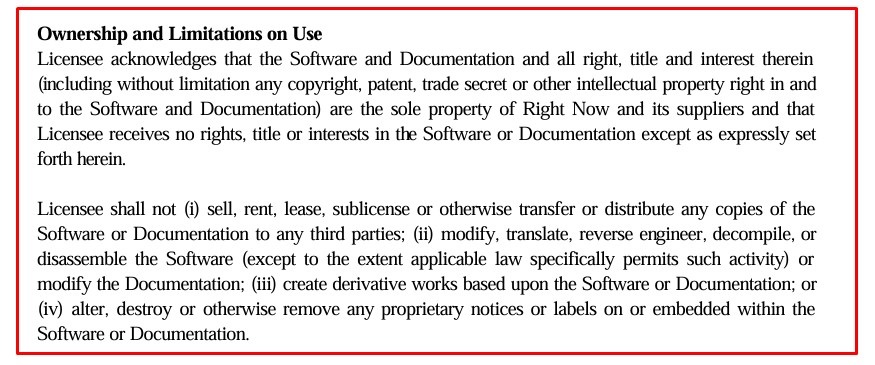
Veritone's Master License Terms and Conditions agreement explains that it can terminate a user's license if the agreement is breached, and lists the consequences of license termination:
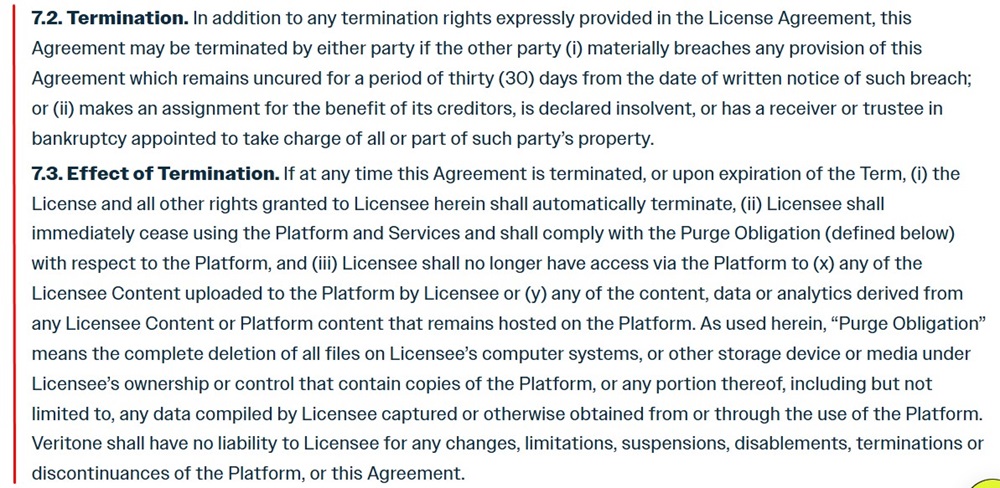
What are the Penalties for Not Complying with California AB 2426?
Businesses that violate California AB 2426 can face a civil penalty and may be charged with a misdemeanor.
The introductory text of California AB 2426 explains that anyone who violates the law can be fined or receive a misdemeanor charge for false advertising:

Summary
California AB 2426 applies to businesses that advertise or sell digital goods to California consumers and use the terms "buy," "purchase," or similar terms in their advertising materials.
Businesses that provide free or non-revocable access to digital goods and businesses that provide digital goods that are only accessible for the duration of a subscription service are exempt from California AB 2426.
You can comply with California AB 2426 by:
- Receiving affirmative acknowledgment of your licensing terms from purchasers, or
- Providing a clear and conspicuous statement that contains required licensing information, and
- Maintaining a License Terms and Conditions agreement that outlines digital goods license details
The acknowledgment or statement must be separate from any other terms or conditions concerning the transaction.

Comprehensive compliance starts with a Privacy Policy.
Comply with the law with our agreements, policies, and consent banners. Everything is included.
